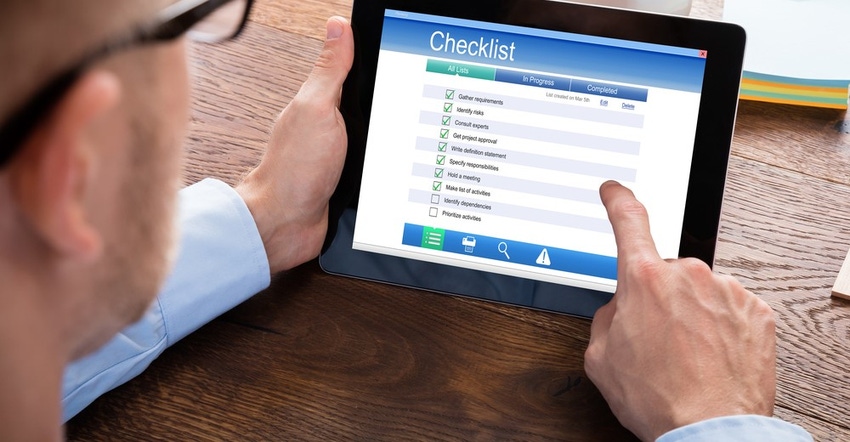If you’re developing a self-storage project, a comprehensive checklist of tasks can help you reduce stress, save money and ensure success. Here are some ideas on what to include from an experienced industry builder.
August 27, 2018

There are a lot of factors that contribute to the success of a self-storage development project: a reliable feasibility study, the right location at the right price, a professional team of experts and contractors, zoning approvals, and more. But the real secret is to create and use a comprehensive checklist to manage the overall process.
If you’re thinking about or already building a storage facility and don’t have a development checklist, start one immediately! If you’ve been conducting preliminary research—and you should—you’re likely amazed at how much information is available on the topic of building self-storage. Every time you read an industry article or speak with an expert, expand your list to include any new or missing elements.
As you develop your project, there will be times when it needs your attention around the clock. There will be other times, sometimes weeks, when much less of your input is needed. Having a comprehensive checklist will allow you to take advantage of down time and work ahead so you never have to rush, which can lead to costly mistakes. A solid list will help reduce stress, save money and ensure a winning project.
Where to Begin
At first, you may not know all the items that should be on your development checklist; but at the top should be “Assemble a team of professionals.” This team will include an industry real estate broker, loan officer, attorney, civil engineer, architect, building manufacturer, contractor, insurance agent, consultant and others. As you hire them, ask for recommendations. What does each person need from you and other team members?
You need to know everything that must be done to build a great self-storage facility on time and within budget. The goal is to create a thorough, end-to-end list, from groundbreaking to grand opening. Personally, I use a five-page checklist that covers 19 major categories:
Getting started
Financial review
Development team
Land requirements and review
Pre-purchase offer, site and zoning review
Land purchase letter of intent
Land contract
Due diligence
Site design
Local, city and state applications and permits
Architectural services for site-plan applications
Architectural services for building design, specifications and permits
Bidding
Final contract
Loan/banking
Building permits
Construction
Pre-opening preparations
Pre-opening marketing
Keep in mind each topic will be broken into subcategories. For example, I have more than 60 items just under “site design.” As a professional engineer, I’ve designed many self-storage facilities and reviewed those designed by others, so I know which items are often forgotten or done incorrectly. Unless you have this kind of firsthand knowledge, it’s critical to consult with your team regarding every step.
Use their expertise to minimize mistakes and create a detailed, point-by-point list. For example, ask the city planner or engineer which applications are required, the components of each and timeframes for approval. Get copies of each application so you know what’s required to complete them and can add those specific tasks. Ask your civil engineer and consultant the same types of questions. They’ll have additional insight on timeframes and what’s necessary to earn approvals.
Finessing the Timeline
While it’s important to have all the right items on your development checklist, the order in which they appear and are completed is also vital. In addition to tasks, you need a timeline to ensure you stay on track. You’ll need to understand the best- and worst-case scenarios for:
Completing due diligence
Closing on your loan and property acquisition
Finalizing facility design
Obtaining project approvals
Collecting construction bids
Many things can go wrong if the timing is off. For example, if you make the land-purchase option too long or short, you risk losing the property. Far too often, the end of the approval and bidding process becomes a crunch because you’re running out of time; but rushing the purchasing process can literally cost hundreds of thousands of dollars. You may even have to pay for an extension.
Think ahead and use moments of free time to work on items further down the list. For example, while you may not need your loan for several months, contact lenders well in advance to understand the options available and which is best for you.
A good checklist will help you understand and mitigate the risks involved in your project. Begin compiling information as early as possible, with help from your team, and add requirements as you go.
Details, Details
There’s no better business than self-storage, but you must have a good game plan. The devil is in the details (particularly those that are missed), so a solid, evolving checklist is critical to success. While the idea of creating and maintaining such a list may seem cumbersome, the secret to staying on course is the motivation that drove you to pursue your project in the first place. Make your list and check it much more than twice. Add to it, and stick with it. You can do it!
Marc Goodin is president of Storage Authority LLC and the owner of three self-storage facilities that he personally designed, built and manages. He’s been helping others in the industry for more than 25 years. To reach him, call 860.830.6764, e-mail [email protected], visit www.storageauthorityfranchise.com. You can also purchase his books on facility development and marketing in the Inside Self-Storage Store.
About the Author(s)
You May Also Like





